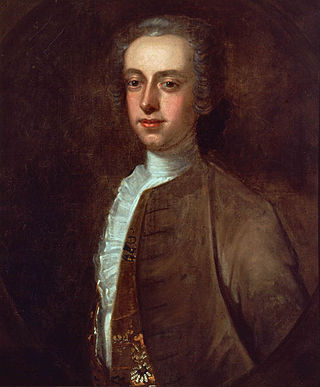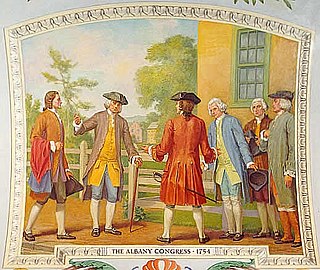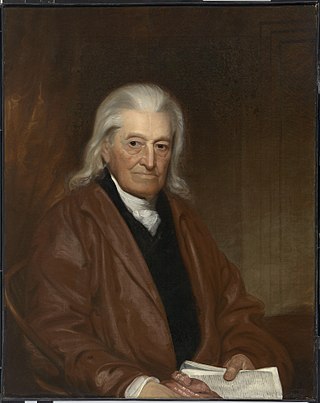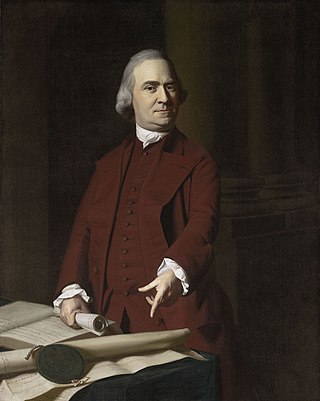The Continental Congress was a series of legislative bodies, with some executive function, for the Thirteen Colonies of Great Britain in North America, and the newly declared United States before, during, and after the American Revolutionary War. The Continental Congress refers to both the First and Second Congresses of 1774–1781 and at the time, also described the Congress of the Confederation of 1781–1789. The Confederation Congress operated as the first federal government until being replaced following ratification of the U.S. Constitution. Until 1785, the Congress met predominantly at what is today Independence Hall in Philadelphia, though it was relocated temporarily on several occasions during the Revolutionary War and the fall of Philadelphia.

The Stamp Act 1765, also known as the Duties in American Colonies Act 1765, was an Act of the Parliament of Great Britain which imposed a direct tax on the British colonies in America and required that many printed materials in the colonies be produced on stamped paper from London which included an embossed revenue stamp. Printed materials included legal documents, magazines, playing cards, newspapers, and many other types of paper used throughout the colonies, and it had to be paid in British currency, not in colonial paper money.

Thomas Hutchinson was an American merchant, politician, historian, and colonial administrator who repeatedly served as governor of the Province of Massachusetts Bay in the years leading up to the American Revolution. He has been described as "the most important figure on the loyalist side in pre-Revolutionary Massachusetts". Hutchinson was a successful merchant and politician who was active at high levels of the Massachusetts colonial government for many years, serving as lieutenant governor and then governor from 1758 to 1774. He was a politically polarizing figure who came to be identified by John Adams and Samuel Adams as a supporter of unpopular British taxes, despite his initial opposition to Parliamentary tax laws directed at the colonies. Hutchinson was blamed by British Prime Minister Lord North for being a significant contributor to the tensions that led to the outbreak of the American Revolutionary War.

Timeline of the American Revolution—timeline of the political upheaval culminating in the 18th century in which Thirteen Colonies in North America joined together for independence from the British Empire, and after victory in the Revolutionary War combined to form the United States of America. The American Revolution includes political, social, and military aspects. The revolutionary era is generally considered to have begun with the passage of the Stamp Act in 1765 and ended with the ratification of the United States Bill of Rights in 1791. The military phase of the revolution, the American Revolutionary War, lasted from 1775 to 1783.

The Albany Congress, also known as the Albany Convention of 1754, was a meeting of representatives sent by the legislatures of seven of the British colonies in British America: Connecticut, Maryland, Massachusetts, New Hampshire, New York, Pennsylvania, and Rhode Island. Those not in attendance included Newfoundland, Nova Scotia, New Jersey, Virginia, Georgia, North Carolina, and South Carolina. Representatives met daily at the City Hall in Albany, New York, from June 19 to July 11, 1754, to discuss better relations with the Native American tribes and common defensive measures against the French threat from Canada in the opening stage of the French and Indian War, the North American front of the Seven Years' War between Great Britain and France.

The Intolerable Acts, sometimes referred to as the Insufferable Acts or Coercive Acts, were a series of five punitive laws passed by the British Parliament in 1774 after the Boston Tea Party. The laws aimed to punish Massachusetts colonists for their defiance in the Tea Party protest of the Tea Act, a tax measure enacted by Parliament in May 1773. In Great Britain, these laws were referred to as the Coercive Acts. They were a key development leading to the outbreak of the American Revolutionary War in April 1775.

The American Colonies Act 1766, commonly known as the Declaratory Act, was an Act of the Parliament of Great Britain which accompanied the repeal of the Stamp Act 1765 and the amendment of the Sugar Act. Parliament repealed the Stamp Act because boycotts were hurting British trade and used the declaration to justify the repeal and avoid humiliation. The declaration stated that the Parliament's authority was the same in America as in Britain and asserted Parliament's authority to pass laws that were binding on the American colonies.

The Sons of Liberty was a loosely organized, clandestine, sometimes violent, political organization active in the Thirteen American Colonies founded to advance the rights of the colonists and to fight taxation by the British government. It played a major role in most colonies in battling the Stamp Act in 1765 and throughout the entire period of the American Revolution. Historian David C. Rapoport called the activities of the Sons of Liberty "mob terror."

William Samuel Johnson was an American Founding Father and statesman. He was the only man to attend all of the four founding American Congresses: the Stamp Act Congress in 1765, the Continental Congress in 1785–1787, the United States Constitutional Convention in 1787 where he was chairman of the Committee of Style that drafted the final version of the United States Constitution, and as a senator from Connecticut in the first United States Congress in 1789-1791. He also served as the third president of Columbia University.

The Stamp Act Congress, also known as the Continental Congress of 1765, was a meeting held in New York City in the colonial Province of New York. It included representatives from most of the British colonies in North America, which sought a unified strategy against newly imposed taxes by the British Parliament, particularly the Stamp Act. It was the second such gathering of elected colonial representatives after the Albany Convention of 1754 at the outbreak of the French and Indian War. Massive debts from that war, which ended in 1763, prompted the British Parliament to implement measures to raise revenues from the colonies. The Stamp Act required the use of specialty stamped British paper for all legal documents, newspapers, almanacks, and calendars, and even playing cards and dice. When in force, it would have an impact on practically all business in the colonies, starting on November 1, 1765. Resistance to it came especially from lawyers and businessmen, but was broadly protested by ordinary colonial residents.

"No taxation without representation" is a political slogan that originated in the American Revolution and which expressed one of the primary grievances of the American colonists for Great Britain. In short, many colonists believed that as they were not represented in the distant British parliament, any taxes it imposed on the colonists were unconstitutional and were a denial of the colonists' rights as Englishmen since the Magna Carta.

Samuel Ward was an American farmer, politician, Rhode Island Supreme Court justice, governor of the Colony of Rhode Island and Providence Plantations, and delegate to the Continental Congress where he signed the Continental Association. He was the son of Rhode Island Governor Richard Ward, was well-educated, and grew up in a large family in Newport, Rhode Island. He and his wife received property in Westerly, Rhode Island from his father-in-law, and the couple settled there and took up farming. He entered politics as a young man and soon took sides in the hard money vs. paper money controversy, favoring hard money or specie. His primary rival over the money issue was Providence politician Stephen Hopkins, and the two men became bitter rivals; the two also alternated as governors of the colony for several terms.
In response to the Stamp and Tea Acts, the Declaration of Rights and Grievances was a document written by the Stamp Act Congress and passed on October 14, 1765. American colonists opposed the acts because they were passed without the consideration of the colonists' opinion, violating their belief that there should be "no taxation without Representation". The Declaration of Rights raised fourteen points of colonial protest but was not directed exclusively at the Stamp Act of 1765, which required that documents, newspapers, and playing cards be printed on special stamped and taxed paper. In addition to the specific protests of the Stamp Act taxes, it made the assertions which follow:

The concept of virtual representation was that the members of the UK Parliament, including the Lords and the Crown-in-Parliament, reserved the right to speak for the interests of all British subjects, rather than for the interests of only the district that elected them or for the regions in which they held peerages and spiritual sway. Virtual representation was the British response to the First Continental Congress in the American colonies. The Second Continental Congress asked for representation in Parliament in the Suffolk Resolves, also known as the first Olive Branch Petition. Parliament claimed that their members had the well being of the colonists in mind. The Colonies rejected this premise.
The Wyllys-Haynes Family is a U.S. political family with its roots in the Connecticut Colony.

Join, or Die. is a political cartoon showing the disunity in the American colonies. Attributed to Benjamin Franklin, the original publication by The Pennsylvania Gazette on May 9, 1754, is the earliest known pictorial representation of colonial union produced by an American colonist in Colonial America. It was based on a superstition that if a snake was cut in pieces and the pieces were put together before sunset, the snake would return to life.

Letters from a Farmer in Pennsylvania is a series of essays written by the Pennsylvania lawyer and legislator John Dickinson (1732–1808) and published under the pseudonym "A Farmer" from 1767 to 1768. The twelve letters were widely read and reprinted throughout the Thirteen Colonies, and were important in uniting the colonists against the Townshend Acts in the run-up to the American Revolution. According to many historians, the impact of the Letters on the colonies was unmatched until the publication of Thomas Paine's Common Sense in 1776. The success of the letters earned Dickinson considerable fame.

Samuel Adams was an American statesman, political philosopher, and a Founding Father of the United States. He was a politician in colonial Massachusetts, a leader of the movement that became the American Revolution, a signer of the Declaration of Independence and other founding documents, and one of the architects of the principles of American republicanism that shaped the political culture of the United States. He was a second cousin to his fellow Founding Father, President John Adams.

The 27 grievances is a section from the United States Declaration of Independence. The Second Continental Congress's Committee of Five drafted the document listing their grievances with the actions and decisions of King George III with regard to the Colonies in North America. The Second Continental Congress voted unanimously to adopt and issue the Declaration of Independence on July 4, 1776.

Early American publishers and printers played a central role in the social, religious, political and commercial development of the Thirteen Colonies in British America prior to and during the American Revolution and the ensuing American Revolutionary War that established American independence.













